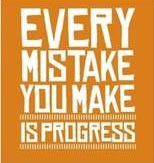Is Your Mindset Stalling Your Career?
 By: Susan Peppercorn
By: Susan Peppercorn
Senior Consultant, ClearRock / Career Coach / Resume and LinkedIn Consultant / Career Blogger for the Huffington Post
Just because some people can do something with little or no training, it doesn’t mean that others can’t do it (and sometimes do it even better) with training. – Carol Dweck
“I’m just not good at interviewing,” Brent told me. “I have the qualifications to do the job but I’m uncomfortable promoting myself. I get interviews but no offers. I’m very unlucky.”
Few of us relish the scrutiny of interviewing. The fact is, it’s challenging to feel under a microscope and stressful to be compared with others. That said, how you approach an interview or almost anything to do with marketing yourself involves behaviors and activities that may be new and uncomfortable. The mindset with which you approach these challenges can mean the difference between success and failure.
Let’s unpack Brent’s comment about being a poor interviewer. It assumes that some people are naturally good at interviewing and others are not. The fallacy in Brent’s thinking is that the ability to interview well is a fixed trait that some people are lucky enough to have. Can it be that the ability to interview well is genetically predisposed? Hardly!
Brent does himself a disservice by buying into this way of thinking. By assuming some people are naturally adept at interviewing and others are not, he leaves himself no opportunity to improve. Brent’s beliefs reflect what social scientists know about how belief systems (what we assume about our abilities and potential) influence our behavior and predict our success. Much of that understanding stems from the research of Stanford psychologist Carol Dweck, explained in her book, Mindset: The New Psychology of Success.
According to Dweck, when a person has a fixed mindset they believe their intelligence and creativity are predetermined, and their successes and failures are a reflection of fixed traits. Studies have shown that people with a fixed mindset view challenging situations as tests of their intelligence, and view mistakes as an indicator of below average ability.
Knowingly or not, fixed thinkers assume that talent alone creates success—without effort. “I’ve seen so many people with one consuming goal of proving themselves. Every situation calls for a confirmation of their intelligence, personality, or character,” says Dweck.
In a growth mindset, people believe that their abilities can be developed through commitment and hard work. Research has shown that people with a growth mindset believe that intelligence is malleable, and that intelligence can increase through hard work. This view leads to a love of learning and the resilience essential for accomplishment. Failure, though disappointing, is viewed as an opportunity to learn, not as a measure of one’s inherent value.
We all experience fixed thinking at one time or another. The following are Dweck’s suggestions for developing a growth mindset:
Step 1. Recognize your fixed mindset “voice.”
As you approach a challenge, the gremlin on your shoulder might say to you, “You don’t have the talent to do this.” “You’ll embarrass yourself.” “What if you fail?” If you encounter a setback, the voice might say, “You see, I told you you’d mess it up.” These thoughts are your fixed mindset voice speaking..
Step 2. Recognize that you have a choice.
How you interpret challenges, setbacks, and criticism is your choice. You can interpret them as signs that you lack the necessary talents or abilities. You can interpret an obstacle as proof that you are deficient (fixed mindset). Or, you can look at it as an opportunity to learn, stretch yourself, and grow your skills. It’s up to you.
Step 3. Talk back to it with a growth mindset voice.
As you approach a challenge: THE FIXED-MINDSET says, “Are you sure you can do it? Maybe you don’t have the talent.” THE GROWTH-MINDSET answers, “Perhaps I can’t do it now, but I believe I can learn to with time and effort.”
FIXED MINDSET: “What if you fail— you’ll be a laughing stock.” GROWTH MINDSET: “Most successful people had failures along the way.”
When you encounter a setback:
FIXED MINDSET: “I told you this would happen because you don’t have the talent.” GROWTH MINDSET: “That is so wrong. Basketball wasn’t easy for Michael Jordan and inventor, Thomas Edison failed many times. Both had a passion and worked at improving even though they encountered numerous failures.”
Then…
Step 4. Take the growth mindset action. Pay attention to both voices, and practice acting on the growth mindset. See how you can make it work for you.
What has worked for you to foster a growth mindset?